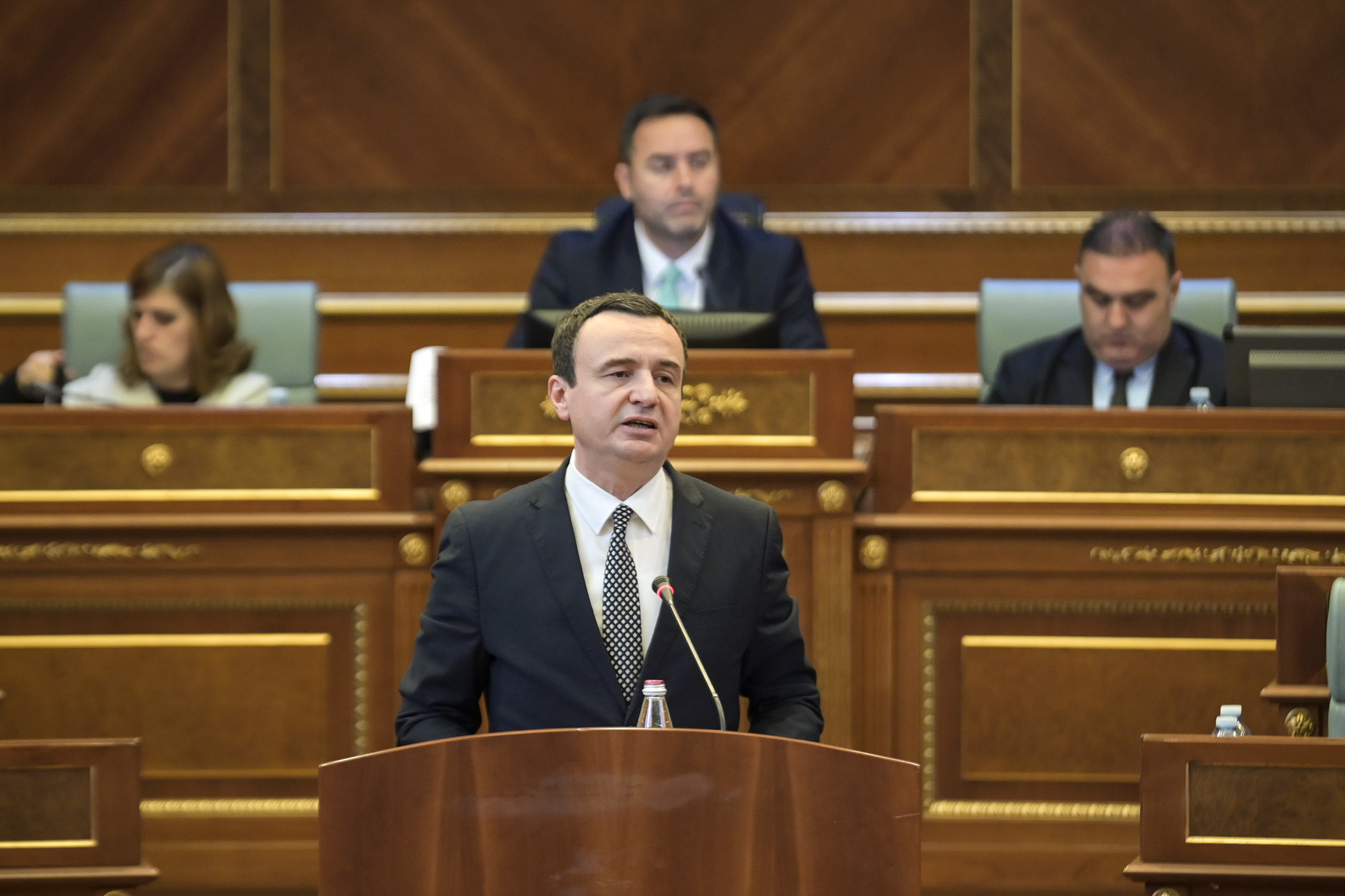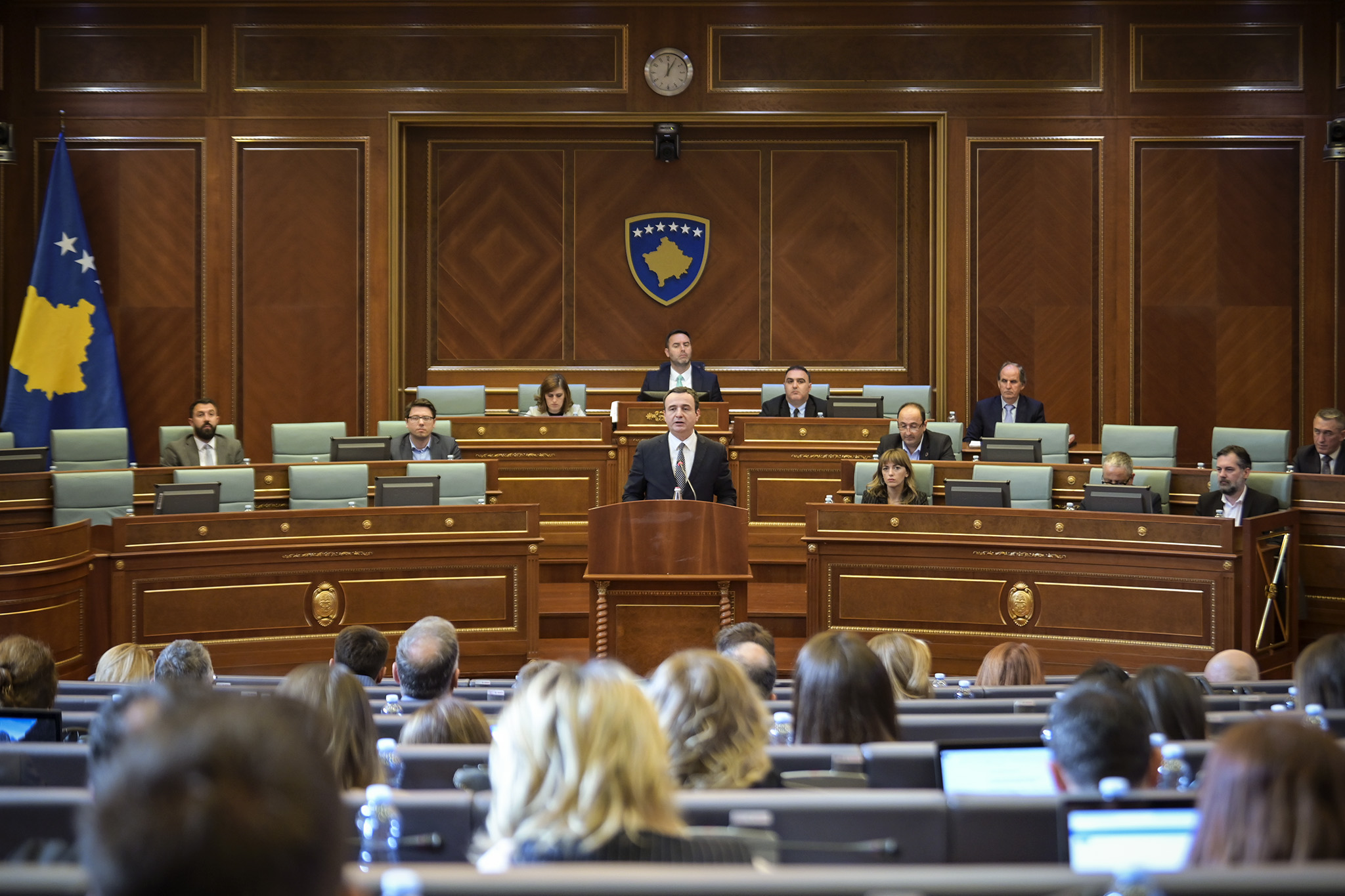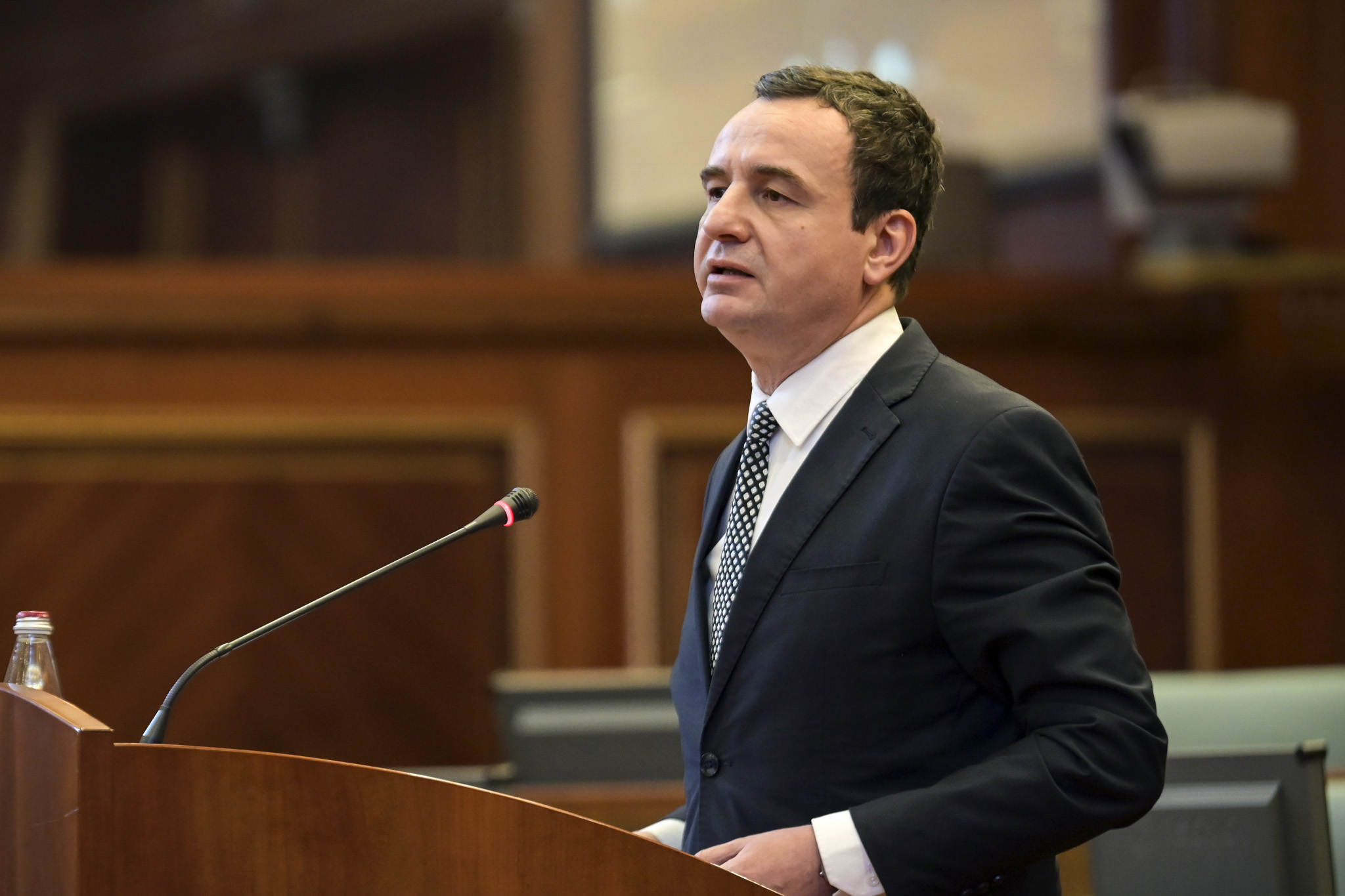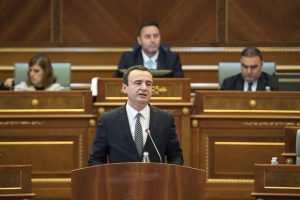Prishtina, 3 November, 2023
Honorable Speaker of the Assembly, Mr. Glauk Konjufca,
Dear members of the Assembly of the Republic,
Dear colleagues from the Government of Kosovo,
Dear citizens,
Every time after the high-level dialogue meetings in Brussels, at the request of this Assembly, I have reported to the deputies and citizens about its results.
The dialogue for the normalization of relations with Serbia is a process that started in March 2011.
A decade of dialogue brought many documents titled as “agreement” and “conclusions”, but what would stand out was the Agreement of April 19, 2013 on the “Association/Community of Municipalities with a Serbian Majority”, which, amid the objections of big from the VETËVENDOSJE! Movement, and not only did this Assembly pass it with two thirds, turning it into a legal obligation and an obligation towards international partners.
On August 25, 2015, the 2013 agreement was added to the general principles/main elements, or as it is known otherwise, for the competences of the Association, which the Constitutional Court of the Republic of Kosovo found violated in 23 articles.
All other agreements that have been reached, and there are a total of 38, were made under the assumption of the normalization of relations with Serbia and for the integration of the north of Kosovo. Two agreements, the one of 2013 and the one of 2015 for the Association / Union of Municipalities with a Serbian Majority, but no agreement for the recognition of Kosovo.
There was no recognition of documents and the extension of sovereignty while the integration of the north was a facade. There, apart from holding referendums and elections in Serbia and disregarding the laws of the Republic of Kosovo, crime and corruption flourished. Instead of the rule of law, Radoiçiq ruled as the leader of criminal and terrorist gangs. And this was a consequence of the dialogue. So neither agreement on recognition nor integration of the north.
From March 2021, when we took over the government, we said that we need a new approach to dialogue. A principled approach as equal parties where mutual recognition is central. The main challenge was the legacy of ten years in the dialogue which, as I said, had not brought the integration of the north nor an agreement on recognition. The government’s primary focus was where the citizens’ demand expressed in the historic elections was. Work and development, justice and welfare.
The dialogue was developed alongside the government’s commitment to work and justice as well as the rule of law throughout the territory of Kosovo. For us, the democratic success and economic development of Kosovo also contributes to the integration of the north. Criminals of all ethnicities and backgrounds are fought by the rule of law.
Of course, the rule of law has often brought us into confrontation with criminal groups in the north, which, as was seen with the September 24 terrorist attack in Banjska of Zveçan, were sponsored and directed by Serbia. However, the rule of law has continued and will continue regardless of the development of the dialogue. This is a big difference that we did not have in those ten years of dialogue. The answer certainly lies in the fact that the criminals in the north of the country were part of the governing coalition.
Two years of dialogue in our government have brought an agreement. It is the Brussels agreement reached on February 27 of this year, which also has the Ohrid Implementing Annex of March 18. The agreement, as it has already been openly stated by the statement of the heads of the countries of the European Union after the meeting in Brussels that we had on October 26, is an agreement for the de-facto recognition of Kosovo by Serbia. So, we have only reached an agreement which brings de-facto recognition of Kosovo by Serbia and this is the result of two years of dialogue.
Dear Speaker of the Assembly,
Dear Members of Parliament,
The Basic Agreement of February 27 in Brussels and its Annex dated March 18 in Ohrid, in the six lines of the preamble and the first five articles, has the de facto recognition of Kosovo by Serbia. But mutual recognition. The other five articles are generally beneficial for both parties and only one article, article 7 of the agreement is related to the legacy from the dialogue of the last decade. However, it is important to understand that Article 7 of the agreement is also the result of the dialogue in these two years. Without Article 7 we would only end up with Article 10 for past agreements.
The position of the Government, as I have repeatedly reported in the Assembly, has been and remains on the full implementation of the agreement we reached in Brussels and Ohrid with the Implementing Annex. In this regard, on October 21, we hosted the five emissaries from the European Union and the United States of America, who brought a plan for moving forward. This plan also included a proposal for a draft statute to implement Article 7 in conjunction with Article 10 of the agreement. We have welcomed and appreciated the new approach and the plan provided for moving forward.
Our reading is that the draft-proposal for the implementation of Article 7 in relation to Article 10 is brought by the five Euro-American emissaries being carefully written for the letter of the constitution I would say, more than for its spirit! The draft proposal provides that it should be reviewed by the Constitutional Court of the Republic of Kosovo immediately after its acceptance.
On October 26, on the sidelines of the European Council Summit in Brussels, we held a meeting with the heads of the European Union, with the Chancellor of Germany, Olaf Scholz, with the President of France, Emmanuel Macron, with the Prime Minister of Italy, Giorgia Meloni, with the President of the European Council, Charles Michel, the Vice President of the European Commission, the High Representative for Foreign and Security Policy, Josep Borrell, as well as his emissary for the Balkan region and dialogue between Kosovo and Serbia, Miroslav Lajcak.
In this meeting, I first and foremost asked for more security on the border between Kosovo and Serbia. The aggression against Kosovo came from Serbia with the paramilitaries who carried out the terrorist attack sponsored by Serbia. I also requested that Serbia be punished and sanctioned for this terrorist attack on Kosovo, since impunity becomes an encouragement for repetition.
So the attack came to us from the other side of the border, which is not sufficiently controlled and protected, while the request for sanctions and punishment is for the sake of non-repetition. So, we do not want anything similar to September 24 to happen again, and we do not see how we can prevent the repetition without sanctions and punishment against Serbia
I emphasized that Kosovo’s membership in the Partnership for Peace as the first step towards full membership in NATO is the best answer. In the meeting, I emphasized that the paramilitary terrorist group of Milan Radoicic and other responsible persons should be extradited from Serbia to Kosovo to face justice. Because the first: The criminal and terrorist act was committed in the territory of the Republic of Kosovo; the second: Kosovo is a champion in the rule of law according to the “World Justice Project” and the third: Even the justice system in Kosovo continues to be monitored precisely by EULEX, the mission of the European Union for Rule of Law.
In this meeting, I also emphasized the democratic and economic progress of Kosovo, and requested that we be given the status of a candidate country for the European Union as soon as possible and that the five non-recognizing states join the 22 member states of the European Union that recognize independence of Kosovo.
Before the heads of the European Union as witnesses and as guarantors, we offered to sign the Basic Agreement of Brussels of February 27, with the entire Implementing Annex of Ohrid of March 18, as well as the proposal for the implementation of Article 7 of the Agreement in relation to Article 10, so for the idea of self-management transformed into a proposal.
The signature would imply acceptance, and therefore implementation. However, acceptance means signature, and only signature means acceptance and guarantee of implementation.
The summit of the European Council in Brussels was the event, but also the place, and the capital, where this would have to happen.
Serbia again refused to sign, thereby rejecting the self-management draft or the implementation of Article 7 of the Agreement in conjunction with Article 10 of the Basic Agreement.
We welcome the joint statement by the heads of the European Union and the states of Germany, France and Italy on October 27 for the call for the de-facto recognition of Kosovo by Serbia, as well as the statement of the President of the European Commission Mrs. Ursula von der Leyen, who was visiting Kosovo this Monday.
We want to move forward. And in this direction, Kosovo’s security from Serbia’s aggression is essential. Strengthening the border with Serbia and strengthening the rule of law in the north are essential. The complete normalization of relations is a mutual interest, therefore mutual recognition is required. The de-facto mutual recognition that has already been achieved with the Brussels Agreement must be implemented.
Our future is in the European Union and in the alliance, friendship and partnership with the United States of America. For the European Union, the United States of America and the Republic of Kosovo, the Basic Agreement in Brussels and the Annex in Ohrid are legally binding.
The Serbian community in Kosovo are citizens of the Republic of Kosovo. They enjoy rights guaranteed and extended by the Constitution of our Republic, the Serbian language is the official language throughout Kosovo at all levels of administration, 17% of local representatives in the Municipal Assemblies are Serbian, while 10 seats are reserved for the Serbian community in The Parliament of the Republic of Kosovo, which is being boycotted and is not being used, also shows that positive discrimination has been the essence of the treatment of the Serbian community by the Constitution of our Republic.
After more than a decade of insisting on Zajednica, Serbia is now refusing to sign a self-management draft brought by the European Union itself and the United States of America. Of course, Kosovo should not and will not be held hostage by Serbia. We really have Serbia as a neighbor, but our roads are separate. Serbia will not be allowed to block the European future of Kosovo, and especially we will not allow it to use the dialogue to block Kosovo and the region.
Dear Speaker of the Assembly,
Dear Members of Parliament,
As much as I can, today I will talk about this draft proposal since this is my obligation, but at the same time without details since this is my obligation to the emissaries from the European Union and the United States of America who have requested that we respect this request of theirs.
I believe that in the future they should and will publish it to provide more transparency in the process, since for us the draft can be published as early as today.
Let me further clarify the draft:
The five emissaries, as part of their Plan, therefore offered a draft statute to implement Article 7 in conjunction with Article 10 of the Basic Agreement. They conveyed the position of the heads of state and their governments that this is a joint proposal of the European Union and the United States of America, namely that it constitutes a document that represents transatlantic unity.
The trans-Atlantic character of the document gave me the impression of a more serious initiative, which I had not encountered before in such a unifying spirit and with such high intensity. Equally important, I was impressed by the fact that very senior officials of each sponsoring state had dealt directly with its text.
They explained to me that the drafting was made with clear and complete care for the Constitution of the Republic of Kosovo, the Letter of Mrs. Federica Mogherini, the American position of Chollet and Escobar, and also, they told me that it is in accordance with the law of the Republic of Kosovo for local self-government and other applicable laws.
From a procedural angle, I do not want to give a legal position now on the compatibility of the draft with the Constitution; the position on the compatibility of the draft with the Constitution will be given by the responsible authority of the Republic, the Constitutional Court, as the draft statute itself clearly provides. However, as the leader of the Government and as a politician, I want to give a political perspective on the draft as follows:
1) The draft, in my political assessment, interrupts the non-recognition legacy of the Republic of Kosovo that was cemented in the Agreements of 2013 and 2015; therefore, in my political judgment, the draft has a clarity regarding the recognition of the Republic of Kosovo as an independent state, in which the Serbs will live in accordance with the multi-ethnic aspirations of the Constitution and without any other purpose, damaging, undermining, for the Republic , in recognition of the sovereign state and our territorial integrity. This is clearly not “Zajednica”, as foreseen in the Agreements of 2013 and 2015, because in this way it would also be indisputable.
2) The draft, in my political assessment, makes it clear that the mechanism to be established will have a “coordinating and cooperative” character; therefore, it will not prejudge nor interfere with the powers of public authorities, municipalities, central bodies, and so on; nobody.
3) The draft closes the space used by Serbia to project to the Serbs in Kosovo a future outside the borders of Kosovo or in ignorance of the borders of Kosovo, and consequently they live with the feeling imposed by Belgrade for a new war for territory or territorial rock or union with anyone else. So, the draft makes it clear that the country is the Republic of Kosovo, and the future is coexistence in the institutions and borders of the Republic of Kosovo. This means that Serbia would have to give up the premise that the Serbs in Kosovo live in Serbia, or that the Serbs in Kosovo may have aspirations of secession, territoriality or autonomy outside the Republic of Kosovo, outside the laws and the Constitution of Kosovo.
4) The draft, finally, closes the circle of overcoming it through the autonomous action of its members. The draft makes it clear that any changes to the statute are made only after the Ministry of Local Government Administration of the Republic has agreed and only after the Constitutional Court of the Republic of Kosovo has issued a permissive judgment.
This overturns what the 2013 and 2015 Agreements built on, namely the assumption they created that participants in an association will be free to advance it in an unknown direction. Such an unknown direction no longer exists and now the direction is clear and known and it is the Constitution and laws of the Republic of Kosovo. Skips, advances and overruns are not allowed and cannot occur.
Dear Members of Parliament,
Dear Speaker of the Assembly,
During the meeting I had on October 26, I told our partners, the heads of the European Union very clearly, that the draft I accepted would not be what I would write, with the same three pillars: The Court’s judgment Constitutionality and Constitutionality, the letter of Mrs. Federica Mogherini and on the other hand the American position of January 30 of this year from the text of Chollet and Escobar.
So, what they have brought is not what I would write and my impression from reading this draft is that it was written with much more care for the letter of the Constitution than for the spirit of the Constitution.
Now, during the conversation, the need was emphasized not only for the political priority of normalizing relations with Serbia, but also for the geopolitical emergency.
So we were at that meeting, we all know, when it was not even three weeks after the start of the Hamas-Israel war and after the Russian aggression in Ukraine was clearly far from over. And, they said it’s an urgent matter. At that moment, I openly said that since there are so many urgent issues, we are taking the Basic Agreement, the Implementation Annex, i.e. the Brussels and Ohrid texts and this draft statute, for which I previously sent a page with my capital remarks to emissary Lajcak and, only as a package where there are all three, but with the order you said and with our request for the status of the candidate country in the European Union and for the NATO Program for the Partnership for Peace, yes we sign tonight. Is it urgent? Since it is urgent, let’s sign it tonight and I have seen appreciation and understanding from them, but after me they had another meeting. They had a meeting with the president of Serbia. I wasn’t at that meeting, but I know the results as you do.
The President of Serbia, firstly, has refused to make any signature and secondly, he has requested, for any agreement, to send an additional side reserve letter, in which he expresses, and this is accepted by the mediators, about the non-acceptance of independence of Kosovo never, for Kosovo never joining the UN, and also for not respecting the territorial integrity of our country.
So, not only has he stalled, he has also taken a step back with the request for non-respect of Kosovo’s territorial integrity.
Now, dear members of parliament and the honorable President,
Brussels says that we have agreements with February 27 and March 18. This agreement has not been signed by the other party, therefore neither by us, despite my willingness and interest to sign that agreement. But Brussels has clearly said we have an agreement, they included it in the conclusions of the European Council and according to the Vienna Treaty, the Vienna Convention on the Association of Treaties, and this is an agreement.
So from the point of view of Brussels it is an agreement. From our point of view it is a deal. But, we say that in order to prevent all its violations and to have a guarantee of implementation, let’s sign it.
More than that, I cannot say about the details of the draft statute because that much can be said regarding my political point of view as the leader of the Government of the Republic of Kosovo.
The five emissaries asked me for guarantees not to make the draft public because its publication would be misused to the detriment of the contribution of the sponsoring governments.
He told me that as a Prime Minister of a responsible state for the moment I must remain loyal to their request. As a Prime Minister who represents a political legacy that insisted on maximum transparency in matters of dialogue, I have to say that I have considered such a request both carefully and with hesitation.
All those who are speaking on my behalf, and many of them are also in this hall, that I have accepted the draft statute, are misinforming. I have not accepted such a draft, I have not accepted it yet, I have not accepted it. And any acceptance does not come into expression without you seeing it, because I have not accepted it and you do not see it.
Accepting it means agreeing and undertaking the obligation to implement the draft, I have not received such a commitment. What I have offered is to sign it and therefore accept it.
I have offered to sign it and therefore accept it. Since there is no signature, there is no acceptance. Since there is no acceptance, there is no enforcement. That is, only the signature means acceptance and there can be no acceptance without a signature.
Serious states negotiate and agree in good faith, create complete clarity and develop consensus by agreeing texts on paper; and give them acceptance and effect through the signature of the heads of states and governments.
I don’t know any other form, without text, without letter and without signature, except those found in medieval history books.
The Republic of Kosovo and Serbia are two independent, separate and separate states, our country is both sovereign and democratic, and both intend to integrate into the EU, but Serbia only formally. Meanwhile, both formally and substantively.
Towards the European Union, there is no negotiation, no democracy, no procedure. There is no advancement without procedure.
I do not understand the President of Serbia, Aleksander Vucic. He signed the same document with two prime ministers of our beloved country, in 2013 and 2015. Why doesn’t he do the same with me now?
Let Serbia either accept the signature or accept that it is not interested in an association, and the latter seems to be the newest position of Serbia. On October 26, Serbia showed that it is not interested in association.
Why is that, I don’t know. Perhaps those who have negotiated in the past trusting Serbia can speak more about Serbia’s tendencies, its motives, but not me.
Once again, I am reiterating to all the deputies and citizens of the Republic the following: I am both ready and interested in signing. Belgrade doesn’t want to sign me.
He signed both with PDK and LDK. Aman, tell me how you did it, so I can learn too. Come here to the podium and let me know honestly and if possible collegially and brotherly how you have done with you, the undersigned. He is running away with me, he is not signing, he is announcing elections.
In your dialogue, he was constant and elections were held in Kosovo, now I am constant and elections were held in Serbia.
How did you get him to sign with you? You talk about how you did it in 2013, you talk about how you did it in 2015.
Let me know how you did it, I am also interested in signing. I am both willing and interested. Speak up, take your word.
Thank you very much!





